
December 26, 2009
 CR Holiday Interview #6—Chris Allen On Powers
CR Holiday Interview #6—Chris Allen On Powers

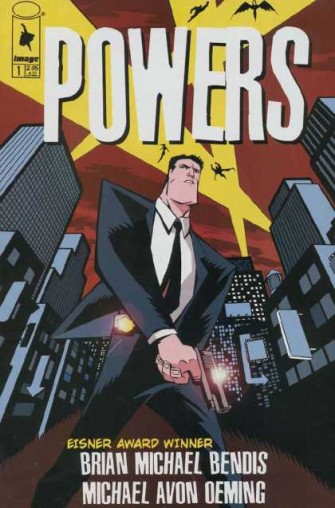
I think
Christopher Allen is the kind of writer about an art form best served by non-traditional outlets like his current home
Trouble With Comics. A lot of what's fascinating about his work might be smoothed over in an old-school print magazine with an firm, outside, editing hand. There's a bristling quality to Allen's engagement with comics, a willingness to give a work of art shit about something personal over an otherwise friendly round of cocktails, that sets Allen apart from his peers. He constantly surprises me. My interest was piqued when one of the books Chris selected was the
Brian Michael Bendis and
Michael Avon Oeming superhero series
Powers. Allen reminds us that sometimes it's the way the book hits you as much as it is the book. -- Tom Spurgeon
*****
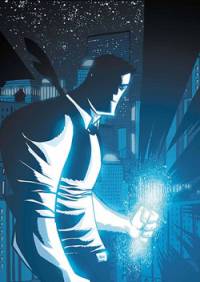 TOM SPURGEON: Have you been with
TOM SPURGEON: Have you been with Powers
from the beginning? When did you dive in, and what were your initial impressions?
CHRISTOPHER ALLEN: I was there from the beginning, though I should be clear that I did fall off the book for a while and there's a gap of a couple years or more since I've read it. I have read the latest #1 issue, though. My initial impressions were that this was the freshest book of the moment, the year 2000, with a writer and artist whose styles I'd never seen before in comics. You have to understand that
Powers arrived at a real perfect storm time for me: I was just getting back into comics after a couple years away and finding that the creators I knew in "mainstream" comics weren't quite doing it for me.
I don't remember quite how I started reading
Powers, but I'm pretty sure it wasn't an impulse buy in the comic shop. I was just getting into the comics internet and found
Jinxworld, Brian Michael Bendis' message board, and just found the guy a natural raconteur, just a really engaging personality. This was such an astonishing development for me, a guy who thought the closest you ever got to comics people was
John Byrne drawing himself in She-Hulk, or maybe nervously telling a creator you really liked their work as they signed a book for you at a comic convention. Yeah, I was already 30 or 31 at the time, but was still really taken into this cult of personality. Bendis was just another geek like a lot of us, except he was getting somewhere, and you wanted him to succeed. Hanging out on the message board and trying to amuse him, or striking up friendships with other visitors, was great. You were part of this community and it was centered around this talented guy and you were with him every step of the way as he started working for Todd McFarlane, then
Powers, then
Ultimate Spider-Man and on and on.
I don't mean to devalue the book itself.
Powers was a blast. I'm looking at the first trade,
Who Killed Retro Girl?, right now, and while some of the art is surprisingly awkward looking back at it now, it still has a lot of charm to it. Good layouts. I was really taken with the big chunks of black space Bendis and Oeming designed to allow moments to sink in, give more space for the winding trails of word balloons, and just give an overall impression that however funny the dialogue might be, there was a lot of darkness in this world. Bendis' writing is so confident here, so full of joy in being allowed to take his readers on a trip through everything he's into. It really could have been a cynical thing: superheroes + police procedural, but it wasn't. Certainly there were plenty of less-inspired books to come after it -- and some good ones, too, like
Sleeper. But not only was Bendis sincere, the message board and the book's letter column were really masterstrokes, not just to build up his fame, but to make the readers a real part of the experience. You had to read the latest
Powers as soon as it came out, so you could get on Jinxworld and talk about it with Bendis and Oeming and everyone else.
 SPURGEON: Were you familiar with Brian Bendis' writing at all going in? He's one of the important mainstream comics writers of the decade, no doubt, if not the most important one. Where does this work stand in his overall development, his array of offerings over the last ten years? I know that some people consider it a best work, while others consider it a transitional one from the crime books to his run on superhero comics. What's your appraisal of his career in general and Powers' place in it?
SPURGEON: Were you familiar with Brian Bendis' writing at all going in? He's one of the important mainstream comics writers of the decade, no doubt, if not the most important one. Where does this work stand in his overall development, his array of offerings over the last ten years? I know that some people consider it a best work, while others consider it a transitional one from the crime books to his run on superhero comics. What's your appraisal of his career in general and Powers' place in it?
ALLEN: I wasn't familiar with his work at all, but quickly caught up with
Jinx and
Torso and
Fortune & Glory. I'm only just now rereading
Powers, spurred by this interview, but I think it might be his best work. I'm not saying that's because it's creator-owned -- most of, say,
Mark Waid's best work is work-for-hire. And
Bendis' Daredevil run is very good as well. That's probably nearly as personal; in fact Bendis' Matt Murdock is probably more fully realized than his Christian Walker, but with
Powers, I think you're getting pretty much all of Bendis: the pulpy side, the quiet observation, the humor, the maniacally rhythmic dialogue. I sort of agree that the book very literally led to him doing "straight" superhero books, and in them he found he could get away with a similar approach, a similar ratio of dialogue to action scenes. But I don't think it's transitional in the sense that he's not done with the book, and this is probably where he's going to go the deepest or furthest out on a limb.
As far as Bendis' career in general, I confess that aside from this new
Powers #1, and that
Siege: The Cabal one-shot a few weeks ago, I haven't been reading his stuff since the first few
Avengers trades. I wasn't enjoying them that much, but that shouldn't be taken as an indictment of his more recent output. I don't really subscribe to the notion of a talented writer losing their ability completely. I think it's the creators with the most distinctive styles who people really turn on the easiest. Now, we can read all this fun, good-not-great '70s
Kirby work and enjoy it for what it is and wonder why people were dissing the guy then, but at the same time, if I had grown up reading Kirby from
Fantastic Four #1 or earlier, I might have grown sick of that style, too.
I don't know that Bendis' strengths are best utilized in superhero team books, or orchestrating events, but I guess I'd prefer he do them than lots of other superhero comics writers. It's important that he keep doing
Powers, or another creator-owned book where he can explore whatever he wants, pretty much unfiltered. If all he did was write Marvel Universe stuff, it's not that his impact isn't felt, but it's easier for those impacts to be minimized, certainly from the standpoint of new creators wiping away what you did, but also because I think you have readers of those books more interested in the characters than the creators or their styles. You know, those people who think it's important that at some point, Iron Man and Captain America have to be buddies again, on the same team of Avengers.
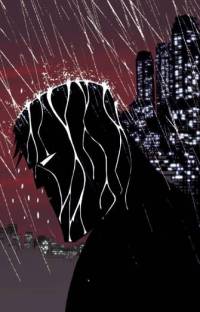 SPURGEON: One of the things I forgot about until I went and looked at a couple of the trades is that
SPURGEON: One of the things I forgot about until I went and looked at a couple of the trades is that Powers
has one foot in crime procedural and another in tabloid biography of all things -- the "behind the scenes" stuff that maybe you don't see as much as you used to at the beginning of the decade. How do you see that peculiar influence at work in Powers
? Does the series say something about celebrity, or is that just another source from which to shape entertaining stories?
ALLEN: I think there's a very fannish side to Bendis and it comes across for the most part without pretension. It's not just that he likes police procedurals like
Homicide and
The Wire and
The Shield -- he likes
David Simon and
David Chase and others and a lot of the fun of reading the book is spotting the influences, what he's into at the time. Reading the first trade again, I'm reminded how much he was into Howard Stern at the time, and there's also lots of famous names that are referenced. You could take Morrison Elementary as a reference to
Grant Morrison instead of
Jim, until you see a reference to
Ray Manzarek. The latest issue flashes back to an unseen chapter in Walker's life that's essentially "The
Rat Pack as Superheroes" -- another mash-up -- and I think Bendis does have a real fascination with larger-than-life characters and the behind-the-scenes stuff of how they make their art. I think he's interested in the less famous creators as well -- the writers and directors of TV and film he admires -- and as a writer who wouldn't read and watch biographies of how people tick. But yes, that stuff is not going to play as well in comics and so naturally you gear your stories to stuff that's a little more sensational, like superhero groupies, power junkies, etc.
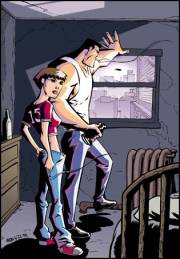 SPURGEON: Including the celebrity culture and its place in the new wave of crime material, do you consider
SPURGEON: Including the celebrity culture and its place in the new wave of crime material, do you consider Powers
a work rich in metaphor? That's generally a way that people ascribe greater significance to a superhero series outside of its entertainment value. What do you feel are its general strengths?
ALLEN: I'm not sure there's a deeper meaning to
Powers beyond, "even superheroes are fucked up." That's nothing new, nor is it all that new to have a world where superheroes are the real celebrities -- you don't see much in
Powers about singers and actors. But amidst all the wise-ass banter and in-jokes,
Powers does have a basic, decent moral about trusting others and putting aside differences for a greater good. It's not easy to package something corny like that in a book so funny and dark. I'm sure for a writer of comics that has to be a prevailing moral for your own life. Neither Bendis nor Oeming are without plenty of other creative opportunities now, and we've seen Oeming write or co-write for others, both work-for-hire and creator-owned. But he and Bendis must still feel they have good work left to do that wouldn't be the same if one of them wasn't in the mix.
 SPURGEON: Do we sometimes look down unnecessarily on material that's "merely" snappily done and entertains?
SPURGEON: Do we sometimes look down unnecessarily on material that's "merely" snappily done and entertains?
ALLEN: Yes, absolutely we -- and I'll put myself in there as well -- tend to look down on well-crafted entertainment that doesn't have a deeper meaning or higher aims, or sometimes we like it fine at first and then get impatient when it's just more of the same good.
I think about
Larry David, who in
Seinfeld and
Curb Your Enthusiasm has consciously created shows where the characters experience little if any growth. He actually set this extreme restriction on his work, but somehow has managed to create this vast catalog of uncomfortable or hypocritical social situations. As ridiculous as they may be played out, those situations are often very real and recognizable. His and
Jerry Seinfeld's other innovation in sitcoms was to present characters who were not that likable, often very shallow and vain and selfish. It was the talent of the cast and writers that made it work.
Friends was not an innovative show -- it was just the same sort of good looking people with silly problems we'd seen many times before in sitcoms. But
Friends was a huge hit because of a likable cast and jokes that made people laugh. Hundreds of sitcoms have come and gone with much shorter lives than
Friends, while other similar shows like
How I Met Your Mother survive year after year without ever capturing the zeitgeist the way
Friends did. I don't think we should get so caught up in whether something surpasses its genre trappings. How many geniuses are there, really? You want to deny yourself
Terry and the Pirates or
Little Orphan Annie because they're not
Peanuts or
Krazy Kat?
 SPURGEON: You mentioned some of these comics earlier, but do you see
SPURGEON: You mentioned some of these comics earlier, but do you see Powers
as a significant part of that whole crime and superheroes genre as it developed -- Brubaker's, Rucka's in particular? Do you think that's been a rich vein for superheroes this decade? What does the overlay of crime material add to the superhero genre?
ALLEN: Well, you say "Brubaker, Rucka in particular," but how easy is it to name anyone else? [Spurgeon laughs] It's a pretty small sub-genre. I mean, you're taking about a vein that's only rich because there are so few other veins. Like,
Warren Ellis has mixed superheroes with lots of other things in
Planetary, but often just for one issue, so that's like a rich network of capillaries for superheroes. I think it's significant only in that these are talented writers working with some very good artists, so some of these books have been successful and opened the door a little wider to the next superhero crime book. If someone took a chance on a superhero sports book and it was better than
NFL Superpro, we might see more of those. Superhero romance books have been tried without much success. Superheroes fight crime, and detectives solve crimes, so they go together a lot easier than another genre.
 SPURGEON: Does
SPURGEON: Does Powers
have anything specific to say about the superhero genre? There's something about the dark sense of humor that I always take in a satirical way.
ALLEN: Yeah. In a way, maybe Bendis needs
Powers more than ever, now that he's so entrenched in the Marvel Universe. He's got a dark sense of humor, anyway, and I see Powers as a place where he can explore some of the ridiculous things about the genre, in the framework of sincere stories.
 SPURGEON: Do you have a favorite arc, a favorite storyline? Why that one? Do you have any sense of what's been more favorably received by the fans of the series and what hasn't? When the comic really works, what factors are in play?
SPURGEON: Do you have a favorite arc, a favorite storyline? Why that one? Do you have any sense of what's been more favorably received by the fans of the series and what hasn't? When the comic really works, what factors are in play?
ALLEN: I'd have to reread more as far as specific arcs, but I'll be honest; one of the reasons I suggested Powers is that it came at the beginning of my "career" (ha) as a critic, and at the beginning of what I think of as my adulthood as a comics reader. It was a moment for me, just like any of the other books on this best-of list really just represent moments, whether ongoing works or done-in-one graphic novels or collected miniseries or whatever.
The moment is past for
Powers as
the hot book, the book that sets the tone for others. Now I'm interested in what it still might have to say, especially as it tailors itself to readers who may not have read it before and only know Bendis as the
Avengers writer or whatever. But I will say in re-reading
Who Killed Retro Girl?, there was a very Moore-like sense of a near-fully realized world here, and lots of hints at stories that would take years to explore. That can be so hazardous -- the book from the young creative team who thinks they've got a real epic on their hands and swings for the fences but don't quite have the strength yet -- but with any story, especially the debut of an indie, creator-owned book, you have to convey such immense confidence and just take that reader by the hand and convince them this is a ride worth taking. Powers really did that so well right from the start, and so most of the people who were there were then going to be willing to follow it when it went on perhaps some less rewarding avenues. I know
the monkey sex issue, which I think was maybe #37? That number sticks in my mind.
Anyway, in trying to bring this sort of
2001: A Space Odyssey type of epic back story to the Walker character, a lot of readers were turned off, because of course then it's not what was expected, superheroes + police procedural. And while I also wasn't a huge fan, it was admirable. It further established Bendis as a real artist, and by that I mean that I believe a real artist
has to disappoint his fans at some point. You can't be struggling and searching and looking to grow without inevitably turning off some of those who were there when you were interested in doing something else. On some level we're all the same people we were a few years ago, or ten or twenty, but in other ways we aren't. It's necessary to try other things, even if -- especially if -- you fail. I'd have to go back and read it, but I'm guessing by setting the story in prehistoric times, Bendis wasn't able to fall back on his gift for snappy dialogue. Pretty brave choice, actually.
 SPURGEON: Michael Avon Oeming is a non-traditional choice for a book like this -- and yet at the same time I think his storytelling precision and design work distinguish
SPURGEON: Michael Avon Oeming is a non-traditional choice for a book like this -- and yet at the same time I think his storytelling precision and design work distinguish Powers
in a way that a more traditional superhero illustrator might not have been able to achieve. What is your impression of his work on the series? What are his strongest qualities as evinced through Powers
?
ALLEN: Oeming is terrific, and only getting better. In retrospect, some of the early stuff is kind of rough but there's still a lot of vitality and smart storytelling there. I happen to like the less blocky current style as he's moved away from what seemed a more
Bruce Timm kind of influence and is maybe more
Toth-like?
I'm going to disagree with you that he's a nontraditional choice. You look at
Michael Lark on
Gotham Central or
Sean Phillips on
Sleeper, or
Paul Grist on
Jack Staff and
Michael Allred on
X-Force -- when you have a superhero book that has other elements or which purports to be a bit outside of traditional superhero stories, you want distinctive artists whose style immediately says this book isn't going to be
Booster Gold. Especially with a crime or espionage book, you want artists who favor lots of shadow and are going to be more concerned with setting a tone than drawing every muscle in a character's torso.
Oeming is, like Grist or Timm, really good at getting the essence of a character in a minimum of lines. When he draws even someone else's character, he fits them to his style and they become part of the world he's depicting, even if they have a costume design he would never do or are normally drawn by someone with a completely different style from his. I would imagine Bendis' scripts aren't the easiest to draw, as a lot of thought has to be put into how to fit all that dialogue in and still have clear, dynamic storytelling. An artist also has to be very good at facial expressions and gestures to best hit the dramatic or comedic beats Bendis has written. Oeming does all those things extremely well. He's an artist I don't get tired of looking at, though like a lot of artists with very recognizable styles, I don't much care to look at the imitators.
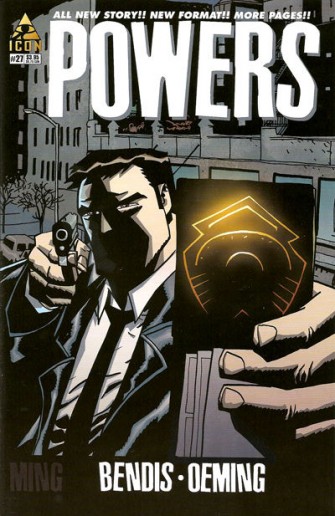 SPURGEON:
SPURGEON: Powers
was moved from Image to Marvel's Icon imprint at about the midway point this decade. For an imprint at a publisher as big Marvel, it seems like Icon never really found a place other than as this odd halfway house for projects by Marvel core creators. Has that been a lost opportunity, do you think? Could the mainstream companies make better use of creator-owned comics imprints?
ALLEN: I don't know if it's a lost opportunity; maybe it can still be made into something. But yes, I don't know why there aren't more Icon books or what the whole strategy is. One would think they might've offered to move Kirkman's
Walking Dead to Icon, huh? Wouldn't some of the books Ellis and
Ennis do for
Avatar fit Icon? I don't know if there's all that much benefit for Marvel to only have Icon be for creators who do other mainstream Marvel Universe books for them. Are there many people who pick up
Criminal out of the blue and
then go read
Captain America because they find out Brubaker writes both? I can understand Icon not being an artcomix imprint -- you want the books there to be printed pretty much like the rest of the stuff they do, but why they don't seem interested in books from folks who aren't already in the Marvel firmament, I don't know.
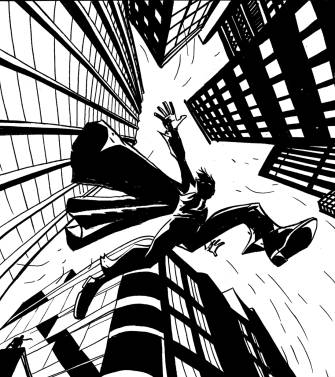 SPURGEON: Given its early place in a certain type of superhero comics and as an avenue for on-line interaction between fan and pro, how might the decade in comics be different if
SPURGEON: Given its early place in a certain type of superhero comics and as an avenue for on-line interaction between fan and pro, how might the decade in comics be different if Powers
had never been published?
ALLEN: I don't want to overstate
Powers' specific importance. I will say that if not for
Powers -- that is, if Bendis hadn't put out this book and if it hadn't been good -- I might not have made some of the friendships I did and might not have started writing about comics at all. A lot of networking went on at Jinxworld. My own story is not important to the decade in comics, of course, but I would say that
Powers not only showed people that you could still find a fresh slant on the superhero genre by mashing it up with another genre, but it did some other things as well, for better or worse.
For the better, I think
Powers is a great example of how important it is for a book -- especially a creator-owned book -- to be welcoming and accessible. Letter columns have largely gone away from monthly comics, due to collections becoming the ultimate publishing format, as well as the internet.
Powers has benefited from both those things and yet it still has a letter column as a nice bonus for those who choose to buy it monthly, it's like a thank you note at the end for the hardcore fans. For the worse, I'm sure some creators have taken
Powers as a model for their careers: do your creator-owned book as a kind of calling card to doing superheroes for Marvel or DC, or getting a movie deal or whatever. As a more ambivalent model, some might see
Powers as an example of "one for them, one for me," as in, Bendis can make his living writing
Avengers and other superhero books, but he puts more of himself into his own creation. Scorsese has done the same thing in his career.
*****
*
Powers Volume One: Who Killed Retro Girl?, Brian Michael Bendis and Michael Avon Oeming, Image Comics, 1582401837, 2000.
*
Powers Volume Two: Roleplay, Brian Michael Bendis and Michael Avon Oeming, Image Comics, 1582402329, 2002.
*
Powers Volume Three: Little Deaths, Brian Michael Bendis and Michael Avon Oeming, Image Comics, 1582402698, 2003.
*
Powers Volume Four: Supergroup, Brian Michael Bendis and Michael Avon Oeming, Image Comics, 1582403090, 2003.
*
Powers Volume Five: Anarchy, Brian Michael Bendis and Michael Avon Oeming, Image Comics, 1582403317, 2003.
*
Powers Volume Six: The Sellouts, Brian Michael Bendis and Michael Avon Oeming, Icon Comics, 078511582X, 2004.
*
Powers Volume Seven: Forever, Brian Michael Bendis and Michael Avon Oeming, Icon Comics, 0785116567, 2004.
*
Powers Volume Eight: Legends, Brian Michael Bendis and Michael Avon Oeming, Icon Comics, 0785117423, 2005.
*
Powers Volume Nine: Psychotic, Brian Michael Bendis and Michael Avon Oeming, Icon Comics, 0785117431, 2006.
*
Powers Volume Ten: Cosmic, Brian Michael Bendis and Michael Avon Oeming, Icon Comics, 0785122605, 2007.
*
Powers Volume Eleven: Secret Identity, Brian Michael Bendis and Michael Avon Oeming, Icon Comics, ISBN 0785122613, 2008.
*
Powers Volume Twelve: The 25 Coolest Dead Superheroes of all Time, Brian Michael Bendis and Michael Avon Oeming, Icon Comics, 0785122621, 2009.
*****
This year's CR Holiday Interview Series features some of the best writers about comics talking about emblematic -- by which we mean favorite, representative or just plain great -- books from the ten-year period 2000-2009. The writer provides a short list of books, comics or series they believe qualify; I pick one from their list that sounds interesting to me and we talk about it. It's been a long, rough and fascinating decade. Our hope is that this series will entertain from interview to interview but also remind all of us what a remarkable time it has been and continues to be for comics as an art form. We wish you the happiest of holidays no matter how you worship or choose not to. Thank you so much for reading
The Comics Reporter.
*
CR Holiday Interview One: Sean T. Collins On Blankets
*
CR Holiday Interview Two: Frank Santoro On Multiforce
*
CR Holiday Interview Three: Bart Beaty On Persepolis
*
CR Holiday Interview Four: Kristy Valenti On So Many Splendid Sundays
*
CR Holiday Interview Five: Shaenon Garrity On Achewood
*****
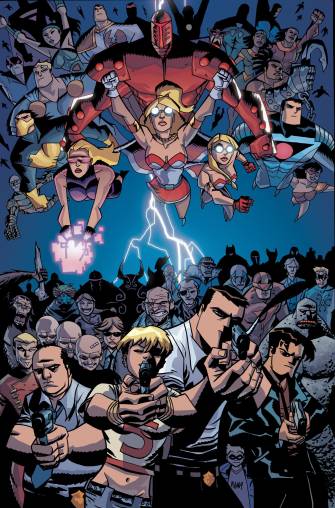
*****
*****
posted 2:00 am PST |
Permalink
Daily Blog Archives
November 2019
October 2019
September 2019
August 2019
July 2019
Full Archives


